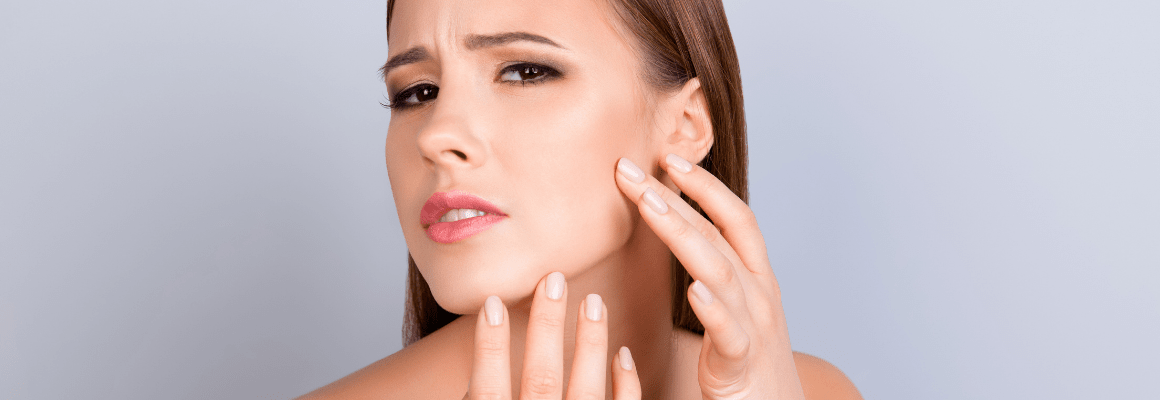If you suffer from eczema, psoriasis, rosacea, or any other irritating skin condition, you've likely tried a variety of remedies, medicines, and treatment options. Many doctors and dermatologists recommend a combination of lifestyle changes, dietary changes, and treatment options like creams - including topical steroids - to help their patients. We are firm believers in natural products and remedies that are safe for your body and our planet. One of nature's greatest healing gifts comes from honey. In this post, we'll cover what makes honey so powerful in naturally treating atopic dermatitis, psoriasis, eczema, and other skin conditions.
What is Eczema?
Eczema is actually an umbrella term to describe a group of inflammatory skin conditions characterized by red, itchy, and irritated skin. There are several different types of eczema, including contact dermatitis, seborrheic dermatitis, and dyshidrotic eczema. The most common type of eczema is atopic dermatitis. While each type has its unique symptoms, the most common characteristics include patches of red skin, roughness, dryness, scaling, and, of course, itchiness.
Eczema is an inflammatory condition that stems from a damaged skin barrier. This damaged skin barrier has trouble retaining moisture which results in the chronically dry skin associated with eczema. A common condition, eczema, affects roughly 10-20% of the population. Despite being such a widespread condition, there is still a lot of negative stigma surrounding it. One of the most common misconceptions is that eczema is contagious. According to research, the exact cause of eczema is actually unknown, but it can be linked to a combination of genetic and environmental factors. Some of the most common eczema triggers include pet fur, smoke, sweat, stress, mold, irritating fabrics like nylon, wool, spandex, extreme weather conditions, harsh chemicals found in makeup and beauty products even the foods you eat.
Benefits of Eczema Honey for the Skin
Honey is a natural healing agent. Humans have been using this sweet and sticky substance for thousands of years to soothe various dermal problems and soothe sore throats, heal wounds, and boost the immune system. And it's no wonder why: honey offers so many health benefits for the skin.
To start with, it's incredibly moisturizing. This quality helps provide the skin with a natural glow while also giving patches of dry, itchy, and flaky skin a much-needed boost of moisture. Honey also has antibacterial properties, which help it treat and prevent acne. The antibacterial properties also make honey useful in warding off infection, especially if relentless scratching causes the skin to crack or bleed. Thanks to its antioxidant properties, honey is also anti-aging and can help to fight face wrinkles. So if you're looking for a natural way to reduce or prevent the appearance of wrinkles, honey can help. Finally, honey is incredibly cleansing for the skin as it helps to open up the pores.
Now, do you see why we love honey for all things skin-related?
What is Manuka Honey?
Have you heard of manuka honey? It is a special type of honey that's native to New Zealand and is produced by bees who pollinate the manuka bush. While we mentioned that humans have been using honey to treat the skin since ancient times, it wasn't until the 19th century that researchers realized the incredible power of Manuka honey. Manuka honey is renowned for its antibacterial properties thanks to a unique compound known as Methylglyoxal. This naturally occurring compound is the magic ingredient that makes Manuka honey so unique.
Regular Honey vs. Manuka Honey
The difference between traditional forms of honey and manuka honey is the amount of Methylglyoxal. The higher the concentration of this compound, the stronger the antibiotic effect. To illustrate just how powerful manuka honey is, it contains 1,000x more Methylglyoxal than traditional forms of honey. That's a lot of antibacterial power! This is what makes manuka honey so effective at healing inflammatory skin conditions like eczema and psoriasis.
While all raw honey contains a certain amount of hydrogen peroxide producing glucose oxidase enzyme, the benefits of Methylglyoxal are far superior since dietary Methylglyoxal is resistant to heat, body fluids, light, and enzymatic activity. Also, manuka oil is even more potent than tea tree oil when battling bacteria and fungus.
Honey needs a minimum rating of 10UMF to be considered strong enough to be therapeutic. To rate Manuka honey's potency, honey producers use a scale known as the Unique Manuka Factor (UMF). The UMF rating reflects the concentration of Methylglyoxal.
Can Honey Heal Atopic Dermatitis?
Atopic dermatitis (AD) is the most common type of eczema. It usually begins in childhood, typically in the first six months of life. While it may go away with age, for most people, it is a lifelong condition. Symptoms may also come and go. Many people experience periods of intense flare-ups and others where symptoms are barely noticeable.
With itchiness being the most burdensome symptom of atopic dermatitis, many patients fall victim to the vicious itch-scratch cycle—85% of patients with this condition experience itchiness every day. According to Dr. Peter Lio, a clinical assistant professor of dermatology and pediatrics at Northwestern University's Feinberg School of Medicine, atopic dermatitis is not just a skin rash. It has a significant impact on the quality of life, making sleeping and concentrating at school or work difficult.
So, can honey heal atopic dermatitis? Like with other forms of dermatitis, there is no cure for AD. However, there are ways to manage the condition and care for your skin to make life better and more comfortable. One natural treatment option is honey. Its anti-inflammatory properties make it a particularly useful treatment to soothe skin conditions like eczema and psoriasis. Its ability to hydrate the skin and reduce the itch also makes honey helpful in treating chronically dry skin conditions.
How to Use Manuka Honey for Eczema
While you can apply raw honey directly to the skin, this tends to get messy and sticky pretty quickly. That's why we prefer to reap the benefits of honey by using it in the form of a cream. A natural treatment we love is this Organic Manuka Skin Soothing Cream. Made with just six ingredients, it's perfect for those with sensitive skin or patients with eczema, psoriasis, or atopic dermatitis. The all-natural ingredients include organic olive oil, organic beeswax, filtered water, grape seed oil, Manuka oil extract, and of course, organic Active 16+ New Zealand Manuka honey. It's a soothing oil-based balm that's sure to moisturize even the driest of skin. With absolutely no burning or stinging, it's perfect for both kids and adults.
We recommend you combine the cream treatment with wet or dry wrap therapy. Wet and dry wrap therapy are simple treatment options that you can do from the comfort of your home. Wet wrap therapy involves covering the cream with a damp piece of clothing and then layering with a dry layer over the top. We recommend keeping the layers on overnight or for a minimum of two hours.
Dry wrap therapy is similar except that you only need to cover with a dry piece of clothing. Both of these treatment options allow emollients to better permeate the skin and enhance their effectiveness. We recommend using these Remedywear™ Eczema Sleeves. Made with TENCEL and embedded with anti-inflammatory zinc oxide, they help protect the skin and provide relief across arms and legs. The unique blend of fibers used to create Remedywear™ has been clinically proven to reduce the severity of atopic dermatitis, reduce itching, and improve quality of sleep when worn three nights consecutively. These sleeves are particularly helpful at reaching hard-to-treat spots like creases of elbows and bends of the knees.
If you're suffering from eczema, psoriasis, or itchy skin on your arms, chest, back, or stomach, combine the Organic Manuka Skin Soothing Cream with this Remedywear™ Long Sleeve Shirt for Adults and Remedywear™ Long Sleeve Shirt for Kids. The shirt can be worn as a protective undergarment beneath regular clothing or alone as pajamas. Thanks to its moisture-wicking sweat control, there's no need to worry about chafing or sweaty irritation.
To treat eczema or psoriasis on the legs, knees, thighs, or buttocks, check out these form-fitting Remedywear™ Pants for Adults and Remedywear™ Pants for Kids. They make a soothing treatment for itchy or sensitive skin during the day or night. Because of their legging-like fit, they're great for wearing underneath regular clothes during the day. You can also wear them during the night as pajamas. You'll love how they truly fit like a second skin.
Finally, for eczema or itchy skin on the hands, check out these Remedywear™ Gloves for Adults and Remedywear™ Kids Gloves. They offer a stretchy fit that extends just past the wrists. Wearing them in combination with the skin-soothing Manuka cream truly helps restore moisture to the fingers, palms, and wrists and boosts the healing process.










